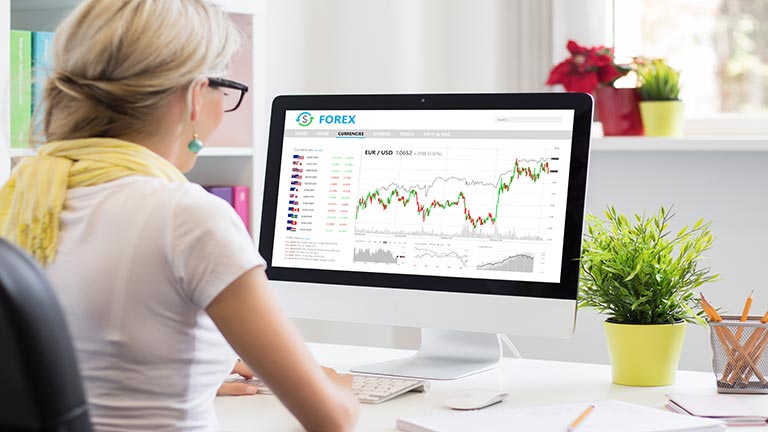The Impact of Economic Events on Leveraged Trading

By Dale Gillham
Leveraged trading offers the potential for significant returns but also comes with heightened risks, especially during periods of economic volatility. Economic events, such as interest rate changes, geopolitical tensions, and recessions, can dramatically influence leveraged trades, presenting both risks and opportunities for traders. Understanding these dynamics is crucial for anyone engaged in or considering leveraged trading. In this article, we will explore how economic events impact leveraged trading, discuss risk management strategies, and provide insights into navigating this complex landscape.
Understanding Leveraged Trading in a Volatile Economy
Leveraged trading involves borrowing funds to increase the size of a trade, amplifying both potential gains and potential losses. This strategy is appealing to traders looking to maximise returns, but it also significantly increases risks, especially during periods of economic uncertainty.
Definition and Mechanics of Leveraged Trading
Leveraged trading allows traders to control a large position with a relatively small amount of capital by borrowing funds from a broker. For example, with a leverage ratio of 10:1, a trader with $1,000 can control a position worth $10,000. While this magnifies potential profits, it also means that losses can exceed the initial investment, leading to substantial financial risk.
Leveraged trading is popular in markets such as forex, commodities, and equities, where small price movements can result in significant profits or losses. However, it requires a deep understanding of market dynamics and a high tolerance for risk.
Popularity and Risks Involved
The appeal of leveraged trading lies in its potential for outsized gains. However, the risks are equally magnified. Market volatility, particularly during economic events, can lead to rapid price movements that may result in large losses if not managed properly. For instance, a sudden interest rate hike by a central bank can cause a sharp decline in currency values, quickly wiping out leveraged positions.
The risks of leveraged trading are compounded by factors such as margin calls, where brokers demand additional funds to cover potential losses. If the market moves against a trader’s position and they cannot meet the margin call, their position may be forcibly closed, locking in losses and potentially leaving the trader in debt.
Why Economic Events Matter in Leveraged Trading
Economic events are significant drivers of market volatility, and their impact is often amplified in leveraged trading. Events such as central bank announcements, geopolitical tensions, and economic downturns can lead to sharp price movements, creating both opportunities and risks for leveraged traders.
For example, an unexpected interest rate hike can strengthen a currency, benefiting traders with long positions. Conversely, traders with short positions may face significant losses. Understanding the potential impact of economic events on leveraged positions is crucial for managing risk and making informed trading decisions.
Key Economic Events That Impact Leveraged Trading
Various economic events can influence market conditions and, consequently, leveraged trading. Understanding these events and their potential effects helps traders better prepare and adapt their strategies.
Central Bank Announcements (Interest Rate Changes, Quantitative Easing, etc.)
Central banks play a pivotal role in shaping economic policy, and their announcements can have a profound impact on financial markets. Interest rate changes, in particular, are closely watched by traders, as they directly affect borrowing costs and currency values.
- Interest Rate Changes: When a central bank raises interest rates, it typically strengthens the national currency by attracting foreign investment seeking higher returns. For leveraged traders, this can present opportunities or risks, depending on their positions. A long position in a currency that is expected to appreciate due to a rate hike could result in significant profits. However, if the market moves against the trader’s position, the losses could be substantial.
- Quantitative Easing (QE): QE involves the central bank purchasing financial assets to inject liquidity into the economy. While this can stimulate economic growth, it often leads to currency depreciation due to an increased money supply. Leveraged traders need to carefully monitor QE announcements, as they can cause significant currency fluctuations.
- Forward Guidance: Central banks often provide forward guidance on the likely future path of monetary policy. This information can be critical for traders, allowing them to anticipate market movements and adjust their leveraged positions accordingly.
Geopolitical Events (Wars, Trade Tariffs, Political Instability)
Geopolitical events can cause significant market disruptions, often leading to increased volatility. These events are unpredictable and can have far-reaching impacts on financial markets, particularly for leveraged traders.
- Wars and Conflicts: Armed conflicts can lead to rapid changes in commodity prices, particularly oil and gold. For example, tensions in the Middle East can drive up oil prices, benefiting traders with long positions in oil futures. However, such events also increase market uncertainty, making leveraged trades more risky.
- Trade Tariffs: Trade disputes and the imposition of tariffs can disrupt global supply chains and impact the profitability of companies involved in international trade. Leveraged traders need to be aware of these developments, as they can lead to sudden changes in stock prices and currency values.
- Political Instability: Elections, coups, and changes in government policies can create uncertainty in financial markets. Political instability in a major economy can lead to capital flight, currency depreciation, and stock market declines, all of which can significantly affect leveraged positions.
Economic Downturns and Recessions
Economic downturns and recessions are periods of declining economic activity, characterised by falling GDP, rising unemployment, and reduced consumer spending. These conditions can have a severe impact on leveraged trading, as markets tend to become highly volatile during such periods.
- Stock Market Declines: During recessions, stock markets often experience sharp declines as investors seek to reduce risk. Leveraged traders with long positions in equities may face significant losses if the market moves against them. Conversely, those with short positions may profit from the downturn, provided they can accurately time their trades.
- Currency Fluctuations: Economic downturns can lead to significant currency fluctuations, especially if a country is perceived to be in a weaker economic position than its peers. Leveraged forex traders need to be particularly cautious during these times, as rapid currency devaluations can result in large losses.
- Flight to Safety: During economic uncertainty, investors often move their capital into safer assets, such as gold or government bonds. Leveraged traders need to be aware of this shift, as it can lead to significant price movements in these assets.
How Traders Can Respond to Economic Events
In response to economic events, leveraged traders must adopt strategies that not only protect their investments but also capitalise on market opportunities. Effective risk management and informed decision-making are key to navigating the complexities of leveraged trading during volatile periods.
Risk Management Strategies During Economic Volatility
Risk management is critical in leveraged trading, especially during periods of economic volatility. By implementing the following strategies, traders can protect their positions and minimise potential losses:
- Stop-Loss Orders: A stop-loss order automatically closes a trade when the market price reaches a predetermined level, limiting the trader’s loss of a position. For leveraged traders, setting stop-loss orders is essential to prevent significant losses during unexpected market movements.
- Position Sizing: Proper position sizing involves determining the appropriate amount of capital to risk on a single trade relative to the overall portfolio. Leveraged traders should avoid taking excessively large positions that could wipe out their accounts in the event of an adverse market move.
- Diversification: Diversifying across different assets and markets can reduce the impact of a single economic event on the overall portfolio. By spreading risk across multiple positions, traders can cushion the impact of volatility in any one asset.
- Hedging: Hedging involves taking an offsetting position in a related asset to reduce the risk of adverse price movements. For example, a trader with a leveraged position in equities might hedge by taking a short position in a market index, reducing potential losses if the stock market declines.
- Margin Management: Monitoring and managing margin levels is crucial in leveraged trading. Traders should ensure they have sufficient margin to cover potential losses and avoid margin calls, which can lead to the forced liquidation of positions.
Leveraging Economic Indicators for Better Decision-Making
Economic indicators provide valuable insights into the state of the economy and can help traders anticipate market movements. By staying informed about these indicators, leveraged traders can make more informed decisions and improve their trading outcomes.
- Interest Rates: As discussed, interest rate changes by central banks can have a significant impact on currency values and borrowing costs. Traders should closely monitor central bank announcements and economic reports that influence interest rate decisions.
- Inflation Data: Inflation affects purchasing power and interest rates, both of which are critical factors in leveraged trading. By tracking inflation reports, traders can anticipate potential market reactions and adjust their positions accordingly.
- Employment Reports: Employment data, such as the unemployment rate and job creation figures, provide insights into economic health and consumer spending. Strong employment data can boost investor confidence, while weak data may signal an economic slowdown.
- GDP Growth: GDP reports offer a snapshot of economic activity and can influence market sentiment. Leveraged traders should consider GDP trends when making trading decisions, particularly in relation to equity markets and currency pairs.
- Consumer Confidence: Consumer confidence indicators measure the optimism or pessimism of consumers regarding their financial situation and the economy. High consumer confidence can lead to increased spending and investment, while low confidence may signal economic weakness.
Case Studies: Successful and Unsuccessful Trades During Major Economic Events
Examining real-world examples of leveraged trades during major economic events can provide valuable lessons for traders. By analysing successful and unsuccessful trades, traders can gain insights into how to apply risk management strategies and make better-informed decisions.
- Case Study 1: The 2008 Financial Crisis: During the 2008 financial crisis, many leveraged traders experienced significant losses as stock markets plummeted. However, those who employed hedging strategies or shorted overvalued assets managed to profit from the downturn.
- Case Study 2: Brexit Vote (2016): The unexpected result of the Brexit vote led to sharp declines in the British pound. Leveraged forex traders who anticipated this outcome and positioned themselves accordingly reaped substantial gains, while those caught off-guard faced significant losses.
- Case Study 3: COVID-19 Pandemic (2020): The onset of the COVID-19 pandemic led to unprecedented market volatility. Traders who quickly adapted to the new economic reality by diversifying their portfolios and focusing on resilient sectors, such as technology and healthcare, were able to mitigate losses and capture gains during the recovery.
Tools and Resources for Tracking Economic Events
To effectively navigate the impact of economic events on leveraged trading, traders need access to reliable tools and resources that provide real-time data and analysis.
Economic Calendars and News Feeds
Economic calendars are essential tools for traders, providing schedules of upcoming economic events, such as central bank meetings, inflation reports, and employment data releases. By staying informed about these events, traders can anticipate potential market movements and adjust their positions accordingly.
News feeds that offer real-time updates on economic developments are also crucial for keeping traders informed about breaking news that could impact the markets. Platforms like Bloomberg, Reuters, and CNBC provide comprehensive coverage of global economic events, helping traders stay ahead of the curve.
Platforms Providing Real-Time Data and Analysis
Trading platforms that offer real-time data and analysis tools are invaluable for leveraged traders. These platforms provide access to market data, charts, technical indicators, and economic news, allowing traders to make informed decisions quickly.
Platforms such as MetaTrader, TradingView, and NinjaTrader offer advanced charting tools, economic calendars, and customisable alerts, enabling traders to monitor market conditions and respond to economic events in real time.
Expert Opinions and Community Forums
Expert opinions and community forums can provide additional insights into how economic events are likely to impact the markets. Following reputable financial analysts, economists, and traders can help traders gain a deeper understanding of market dynamics and potential trading opportunities.
Community forums, such as those on Reddit or TradingView, offer a platform for traders to share ideas, discuss market trends, and learn from each other’s experiences. Engaging with these communities can provide valuable perspectives and strategies for navigating leveraged trading during volatile periods.
Navigating the Complex World of Leveraged Trading
Leveraged trading is a powerful tool for maximising returns, but it requires a deep understanding of market dynamics and a disciplined approach to risk management. Economic events can significantly impact leveraged positions, creating both opportunities and risks. By staying informed, employing effective risk management strategies, and utilising the right tools, traders can navigate the complexities of leveraged trading and improve their chances of success.
Key Takeaways for Leveraged Traders
- Understand the Impact of Economic Events: Economic events, such as interest rate changes and geopolitical tensions, can lead to significant market volatility. Leveraged traders must stay informed about these events and anticipate their potential impact on the markets.
- Implement Risk Management Strategies: Risk management is critical in leveraged trading. Strategies such as stop-loss orders, hedging, and diversification can help protect against significant losses during volatile periods.
- Leverage Economic Indicators: Economic indicators provide valuable insights into market conditions. By monitoring indicators such as interest rates, inflation, and GDP, traders can make more informed decisions and improve their trading outcomes.
- Stay Informed and Adaptive: Leveraged trading requires constant vigilance and adaptability. By staying informed about economic developments and market trends, traders can adjust their strategies to capitalise on opportunities and mitigate risks.
Encouragement to Stay Informed and Adaptive
Leveraged trading offers substantial opportunities, but it also comes with considerable risks, particularly during periods of economic volatility. Staying informed about economic events, understanding their potential impact on the markets, and adapting your trading strategies accordingly are essential for success.
At Wealth Within, we are committed to providing the education and resources you need to navigate the complex world of leveraged trading. Our courses are designed to equip you with the knowledge and skills necessary to manage risk effectively and make informed trading decisions, even in the face of economic uncertainty. By leveraging our expertise and staying informed, you can confidently navigate the challenges of leveraged trading and work towards achieving your financial goals.






